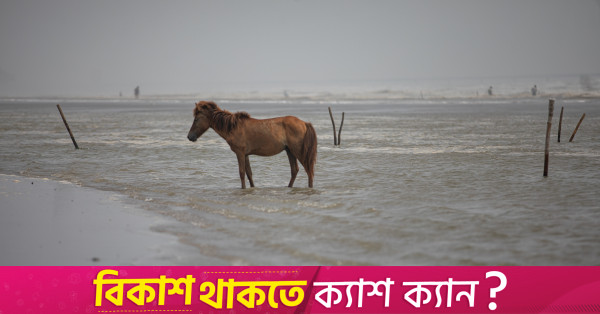Cox’s Bazar horses ‘set free’, not abandoned: Owners claim


The reason behind horses roaming freely is deeply integrated with the tourist-based economy of the beach city.
A recent picture of a lone horse standing on Inani Beach in Cox’s Bazar, published by The Business Standard, went viral on social media last week.
Many commenters criticised horse owners, describing the situation as “gross animal abuse.” However, horse owners in Cox’s Bazar claimed that horses in the area are often “set free” rather than abandoned.
If you visit the Cox’s Bazar, depending on the season, you might stumble upon unleashed, lone horses roaming freely around the beach with no one looking after them. They can be found lying on the sand, looking for food in garbage heaps or out on the streets.
A horse stands forlornly alone on Inani Beach in Cox’s Bazar, abandoned by its owner. Locals said this horse, once used to carry tourists, has been wandering alone for several days. The injured horse is now unable to carry weight, making it “useless” for its owner. Photo: Rajib Dhar
“>
A horse stands forlornly alone on Inani Beach in Cox’s Bazar, abandoned by its owner. Locals said this horse, once used to carry tourists, has been wandering alone for several days. The injured horse is now unable to carry weight, making it “useless” for its owner. Photo: Rajib Dhar
The business
According to Cox’s Bazar Horse Owners Association, the hoofed mammals are primarily used to entertain the huge swathe of tourists visiting the beach town.
The association says there are 60 horses that are used to make money by their owners. For a decent amount of fee, which varies depending on demand, tourists can ride the horses, take pictures with them or take them for a walk.
Especially during peak tourist season from December to March, one horse can earn up to Tk4,000 daily for their owners. Throughout the season, the amount can add up to Tk2.60 lakh.
In return for the money earned, the owners provide the animals with food, shelter and health services. The relation is mostly dependent on the monetary value of the four-legged mammals.
So, the question remains: why are the horses left alone or abandoned by their owners?
The abandonment
The reason behind owners leaving the horses abandoned is deeply integrated with the tourist-based economy of the beach city.
While the horses can pull in Tk4,000 during peak tourist season, the income falls drastically lower during the off-season.
But that is not all.
“We have to let our horses roam free. If they remain stuck for long in stables, they start to misbehave,” said Nurul Alam, who owns three horses and uses them for business.
“It’s not possible to unleash the horses regularly. We have to use them for business when there are tourists. Hence, we let them run free during the off-season,” he added.
The ongoing season is not profitable for tourism-based businesses. Lone horses can be seen roaming around the beach, streets and even near hotels.
“Now is the monsoon season. Rain and bad weather are the norm. It is time to let the horses go free. They return on their own. They graze on grass and eat various foods while roaming around the beach. But they always return home,” said Nurul.
There are some horses, however, that can get lost, he added.
“We have to tie those horses with ropes.”
Many who work or live around the Cox’s Bazar sea beach have said that when income is not generated, the horse owners employ strategies to avoid spending on horse feed by releasing the horses onto the streets.
Additionally, there have been instances where owners deliberately abandon older or incapacitated horses.
Photo: Nupa Alam
“>
Photo: Nupa Alam
“Although owners use horses as a source of income, they do not properly fund their medical treatment or provide adequate food when the horses fall ill,” said Belal Hossain, a beach worker at Cox’s Bazar.
“When horses become old and incapacitated, they are also abandoned. Despite the administration’s prohibition against such practices, business owners continue to disregard these rules,” he added.
However, Ahsan Uddin Nishan, president of the Cox’s Bazar Horse Owners Association, said older horses are occasionally let go to “keep them cheerful.”
He explained that the horses are sometimes released and then brought back after a specific period. Older horses are always kept under close watch, and no negligence is tolerated in their care.
Many older horses also die and are buried by their owners.
He mentioned that the horses are under constant supervision with the assistance of veterinary hospitals and the Department of Livestock.
“Each horse can work for about eight to ten years. Daily expenses for feeding a horse amount to Tk600, and medical expenses increase when the horses fall ill,” said Nishan.
In cases where income decreases or stops, many horse owners release their horses. These horses then wander and scavenge for food, which he remarked is inappropriate.
Hasan Ahmed, a Cox’s Bazar Beach business owner, mentioned that he owns two horses. He used the income generated from these horses to buy their feed daily, and the remaining money supports his family.
Caring for the horses involves following specific rules, such as occasionally releasing them, keeping them in open spaces, bathing, and feeding them.
“Special attention is needed when horses age, but many owners do not comply with these requirements,” said Hasan.
‘Inhumane’
While the horse owners say their decision to let the horses roam free is justified and necessary, civil society organisations and the local administration have differing opinions.
“The horses have brought wealth for many. Many people even built houses and bought cars with the money earned using horses. Some even started new businesses with that money. But when their business opportunity with the horses dips down, they stop feeding the animals and let them roam free. This is inhumane,” said Farhad Iqbal, general secretary of Cox’s Bazar People’s Forum.
Farhad also said such roaming horses sometimes even cause fear among people.
“The matter was discussed in 2020. The local administration had ordered the horse owners not to let the animals roam free. But they are not complying.”
Photo: Nupa Alam
“>
Photo: Nupa Alam
Mentioning the death of 24 horses in 2021 during the Covid-19 pandemic, Farhad said these deaths occurred gradually after the horses were released.
“This caused an uproar after the news was published in the media. Although releasing horses was temporarily stopped due to various directives, it has started again,” he said.
Farhad mentioned that the administration needs to take stricter actions to prevent the same from happening again.
Cox’s Bazar Municipality Mayor Mahbubur Rahman echoed a sentiment similar to that raised by Farhad.
“We have asked the horse owners many times to stop letting the horses roam free. These horses obstruct transportation and businesses and cause fear among people.
“If the owners keep doing this, we will confiscate the horses and transfer those to Bangabandhu Safari Park in Dulahazara,” said the mayor.
Cox’s Bazar Additional District Magistrate Ataul Goni Osmani said the administration will soon sit with the horse owners to discuss the matter.




